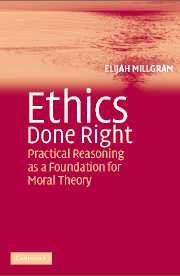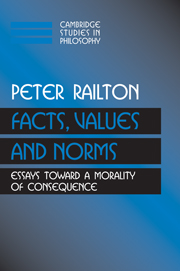Ethics Done Right
Ethics Done Right examines how practical reasoning can be put into the service of ethical and moral theory. Elijah Millgram shows that the key to thinking about ethics is to understand generally how to make decisions. The papers in this volume support a methodological approach and trace the connections between two kinds of theory in utilitarianism, in Kantian ethics, in virtue ethics, in Hume's moral philosophy, and in moral particularism. Unlike other studies of ethics, Ethics Done Right does not advocate a particular moral theory. Rather, it offers a tool that enables one to decide for oneself.
- Covers three main types of moral theory (and a couple of exotic ones)
- Explores the foundations of ethics but not metaethics
- Connects practical reasoning and moral theory
Reviews & endorsements
"The book's two-fold aim is thus to (i) show that all normative ethical theories presuppose some kind of 'theory' of practical reasoning and (ii) to critically evaluate a number of these views (including utilitarian, Kantian, Humean, and particularist ones). Millgram succeeds on both counts, but also does so much more, making important contributions to Hume and Mill exegesis along the way (essays 6-8 and 2 respectively) that no scholar of either philosopher can afford to miss. His revisionist 'Was Hume a Humean?' (Chapter Seven) in particular, ought to be a staple in future anthologies of Hume scholarship, alongside related papers by Christine Korsgaard and Jean Hampton."
-Constantine Sandis, Metapsychology
"... a careful, serious, and incisive engagement with some of the major protagonists
in the history of moral philosophy... its quality... is consistently high. Anyone interested in any of the topics Millgram discusses will be rewarded by reading the relevant essays: it is an impressive achievement that Millgram is able to deal with such a wide range of canonical material with both a scholarly attention to interpretive detail and an eye always to integrating the details into the larger picture he wants to defend. The writing is admirably concise and colloquial; it combines clarity, directness, and sophistication, and it is consistently
thought provoking."
-Garrett Cullity, University of Adelaide, Ethics
Product details
October 2005Adobe eBook Reader
9780511128417
0 pages
0kg
This ISBN is for an eBook version which is distributed on our behalf by a third party.
Table of Contents
- 1. Introduction: the method of practical reasoning
- 2. What's the use of utility?
- 3. Mill's proof of the principle of utility
- 4. Does the categorical imperative give rise to a contradiction in the will? 5. Reasonably virtuous
- 6. Murdoch, practical reasoning, and particularism
- 7. Was Hume a Humean? 8. Hume on 'is' and 'ought'
- 9. Hume, political noncognitivism, and the history of England
- 10. Incommensurability and practical reasoning
- 11. Commensurability in perspective
- 12. Varieties of practical reasoning and varieties of moral theory.





